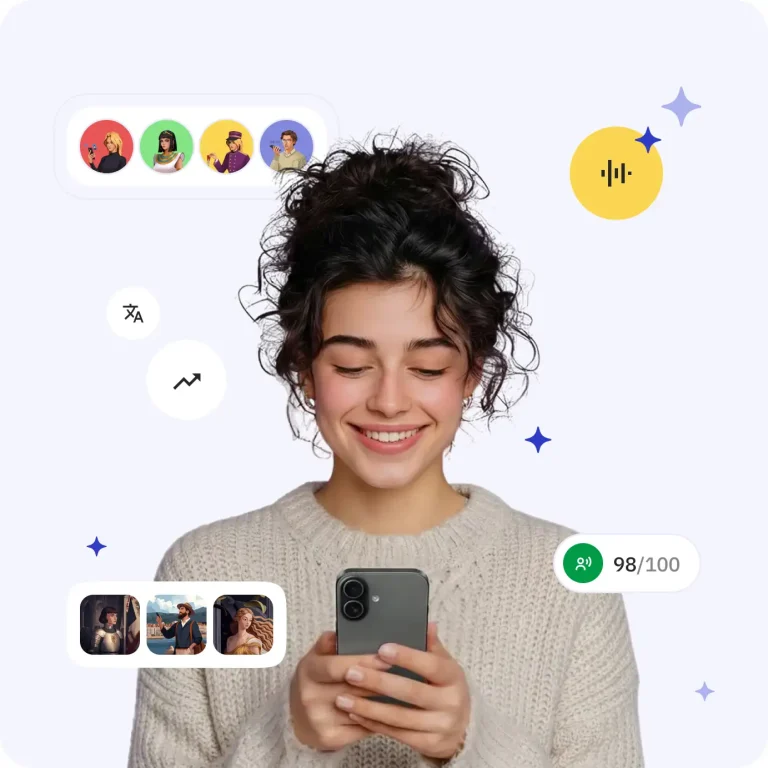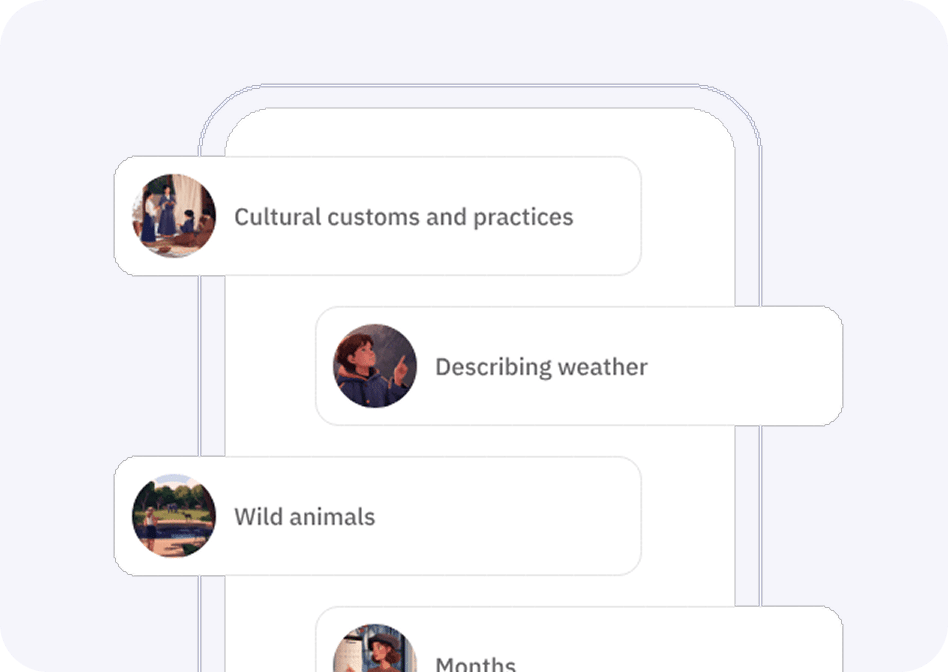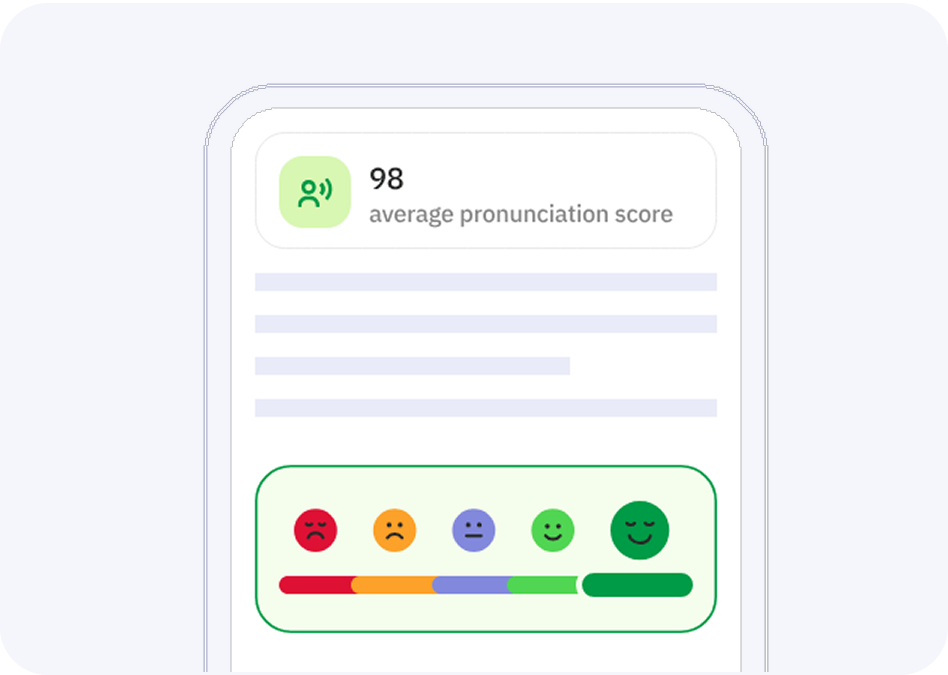50 Funny English Words That Will Tickle Your Language Bone
Embarking on an adventure through the English language, one can’t help but stumble upon words that, in their sheer quirkiness, evoke a chuckle or a bemused tilt of the head. These linguistic nuggets add spice to our conversations and peak curiosity among language lovers and learners alike. Here’s a treasure trove of 50 funny English words that might just tickle your funny bone. Get ready for a whimsical lexicon rollercoaster that’ll leave you chortling and perhaps a touch enlightened!

The talkpal difference

Personalized Education
Every student has a distinct style of acquiring knowledge. Through Talkpal technology, we analyze the study patterns of millions of users concurrently to build highly effective educational frameworks. These insights allow us to fully customize the lesson plans for every single user based on their specific interests and needs.

Cutting-Edge Technology
Our main mission is to lead the way in providing a unique study experience for every person. We accomplish this by leveraging the most recent innovations in technology to ensure you get the best AI-driven guidance available.

Making Learning Fun
We have transformed the educational process into a delightful activity. Since maintaining motivation in an online setting is often difficult, we developed Talkpal to be immersive and exciting. The experience is so compelling that many users prefer improving their language skills with our app instead of playing video games.
LANGUAGE LEARNING EXCELLENCE
The most efficient way to learn a language
Try Talkpal for freeFunny Words in English
1. “Lollygag” – To lollygag is to spend time aimlessly or to dawdle, often much to the annoyance of anyone waiting on you. Picture someone leisurely enjoying a lollipop, unconcerned with the ticking clock.
2. “Flummox” – To be flummoxed is to be utterly and hopelessly confused. Think of a magician whose trick has gone awry, leaving him scratching his head in public.
3. “Kerfuffle” – A commotion or fuss, especially one caused by conflicting views. Kerfuffle is the verbal equivalent of a chicken flapping about in a barnyard—lots of noise, feathers everywhere, but no one truly hurt.
4. “Canoodle” – To canoodle is to engage in affectionate and amorous caressing or cuddling. It’s the old-timey way of saying two people are getting quite cozy with one another.
5. “Discombobulate” – This fun-sounding word means to upset or disconcert; it’s the feeling you get when your routine is disrupted, and everything feels topsy-turvy.
6. “Snollygoster” – A shrewd, unprincipled person, especially a politician. Snollygoster sounds like a creature from a children’s book that you wouldn’t trust with your cookie jar.
7. “Gobbledygook” – Language that is nonsensical, obscure, or unintelligible. It’s what you might expect to read in the fine print of a legal document or a particularly confusing instruction manual.
8. “Malarkey” – Meaningless talk or nonsense. Grandparents are often heard telling young’uns to stop their malarkey when the kids’ fanciful tales grow a bit too tall.
9. “Flapdoodle” – This is another, perhaps even sillier, word for nonsense. It begs to be said with a playful wag of the finger and a mock-serious face.
10. “Skedaddle” – To run away hurriedly; flee. The word skedaddle conjures images of cartoon characters making a hasty and humorous retreat, legs spinning before they even hit the ground.
11. “Flibbertigibbet” – A frivolous, flighty, or excessively talkative person. It has a sing-song quality that might remind you of a gossiping bird hopping from branch to branch.
12. “Mumbo Jumbo” – Words or activities that seem complicated but are nonsensical or without meaning. Think of a wizard whose spells are more show than substance.
13. “Nincompoop” – A foolish person. It’s the harmlessly rude name you might call a friend after they’ve done something particularly silly.
14. “Widdershins” – This unusual term refers to a direction opposite to the usual way, or counterclockwise. It’s what you’re doing when you feel like walking around a table the ‘wrong’ way just for the fun of it.
15. “Snickersnee” – We’re not talking about the chocolate bar here. A snickersnee is a large knife. It sounds more like something you’d encounter in a Dr. Seuss book than in the kitchen.
16. “Cattywampus” – Askew or awry; positioned diagonally. It’s like when you hang a picture frame and step back to find it’s not quite straight, much to your chagrin.
17. “Gallivant” – To go around from one place to another in the pursuit of pleasure or entertainment. It’s what you do on a Saturday when chores have lost their allure.
18. “Brouhaha” – A noisy and overexcited reaction to something; a hubbub. It’s the commotion at a surprise party when the surprise-er becomes the surprise-ee.
19. “Taradiddle” – A petty lie or pretentious nonsense. Children caught with their hand in the cookie jar often resort to a taradiddle or two.
20. “Bodacious” – Excellent, admirable, or attractive. Bodacious brings to mind surfers catching the perfect wave under a shining sun.
21. “Hoosegow” – A slang term for a jail, derived from the Spanish word ‘juzgado’. It’s often used in the playful context of old Westerns.
22. “Fandango” – An elaborate or complicated process or activity. It also refers to a lively Spanish dance. Planning a simple event can turn into a full-blown fandango if you’re not careful!
23. “Collywobbles” – Pain in the abdomen or a feeling of nervousness. It’s that funny feeling in your tummy before a big test or exciting ride.
24. “Whippersnapper” – A young and inexperienced person considered to be presumptuous or overconfident. The age-old term of endearment (or mild annoyance) for those youthful up-and-comers.
25. “Gymnophobia” – Fear of nudity, and no, it doesn’t mean you’re scared of the gym. It’s the anxiety one feels when the dressing room curtain seems just a bit too thin.
26. “Quibble” – To argue or raise objections about a trivial matter. It’s the back-and-forth banter you have with a friend over who’s to blame for eating the last cookie.
27. “Hogwash” – Nonsense, balderdash. When someone tries to tell you that pigs are starting to fly, you’d rightly call it hogwash.
28. “Rambunctious” – Uncontrollably exuberant; boisterous. Think of puppies tumbling around in play, all legs and enthusiasm.
29. “Poppycock” – Similar to hogwash, this is also a way to dismiss something as nonsense. It’s more of a grandparent’s word, used when the latest tall tale just doesn’t fly.
30. “Tittle-Tattle” – Idle gossip or chatter. Tittle-tattle is what’s overheard on the grapevine and taken with a grain of salt.
31. “Bamboozle” – To deceive or get the better of someone by trickery. It’s what a huckster does best, with a wide grin and a twinkle in his eye.
32. “Woolgathering” – Indulging in aimless thought or daydreaming. It’s when your mind meanders away from the task at hand to far-off imaginary lands.
33. “Claptrap” – Absurd or nonsensical talk or ideas. Claptrap might come out of a politician’s mouth just before an election.
34. “Donnybrook” – An uproar or brawl; a free-for-all fight. It might refer to the melee that ensues when a tavern patron’s temper flairs.
35. “Blatherskite” – A person who talks at great length without making much sense. You might have a blatherskite in your life, and it’s quite an amusing word to unleash in their presence (perhaps not to their face).
36. “Bibliopole” – A person who buys and sells books, especially rare ones. It sounds like someone who specializes in literary fishing.
37. “Dillydally” – To waste time through aimless wandering or indecision. It’s the art of taking the scenic route through your morning routine.
38. “Hocus-pocus” – Deceptive or tricky procedures or talk. Used when a magician pulls a rabbit from a hat or when the fine print seems to be written in an ancient spell language.
39. “Scuttlebutt” – Rumor or gossip. Something sailors might exchange as they scrub the deck, perhaps about the captain’s mysterious map.
40. “Knickknack” – A small ornament or trinket, often considered of little value. Every home has a shelf or two dedicated to these delightful dust collectors.
41. “Pettifogger” – A petty, unscrupulous lawyer, or one who quibbles over trivial matters. The pettifogger makes mountains out of legal molehills, often while wearing an impressively shiny suit.
42. “Codswallop” – Utter nonsense, something that is not to be believed. It’s an old British term that sounds like it could’ve been an actual variety of wallop (though it wasn’t).
43. “Piffle” – An equally light and fluffy term for trivial or nonsensical fuss. Piffle might be the stuff that dreams are made of—or rather, the clouds they float on.
44. “Humdinger” – A remarkable or outstanding thing of its kind. It might be your grandmother’s prize-winning apple pie or a sports car that looks like it belongs in a superhero movie.
45. “Cankle” – A non-medical, somewhat cheeky term describing the area where the calf and ankle appear to merge. A bit of humor injected into the self-deprecation one feels after a long flight.
46. “Snickerdoodle” – A type of cookie coated with cinnamon sugar that manages to taste far more serious than it sounds. It’s often said with a smile, especially to children.
47. “Folderol” – Foolishness or nonsense. It could be used when the talk at the tea party turns particularly trivial.
48. “Guffaw” – A loud and boisterous laugh. It’s that infectious belly laugh you just can’t contain when someone tells a particularly good joke.
49. “Absquatulate” – To leave abruptly. It’s a word that paints the picture of an old-timey bandit making his great escape, bags of loot swinging.
50. “Rigmarole” – A lengthy and complicated procedure. It’s what you call the process when signing up for something simple seems to require endless forms, queues, and patience.
These words are the linguistic equivalent of a funhouse mirror – they twist and contort the English language into shapes and sounds that delight and entertain. By weaving these funny English words into our vocabulary, we not only enrich our conversations but also pay homage to the playfulness that’s innate in human communication. So next time you feel your speech could use a splash of color, why not sprinkle in a snollygoster or a taradiddle? Your listeners will certainly thank you for the smiles.
The most efficient way to learn a language
Try Talkpal for freeFrequently Asked Questions
Can using funny English words help boost my conversational skills?
Can funny English words make my presentations or speeches more interesting?
How can I incorporate funny English words into my vocabulary effectively?







